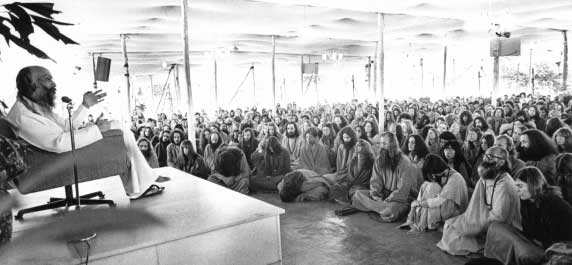Osho: The meaning of satsang
The Master is a presence; the Master is not a doer. The real Master never does a thing but his presence functions as a catalytic agent.
Much happens through his non-doing. That is the paradox of the existence of a Master: without doing, much happens. So the whole thing depends really on the disciple: if he is receptive things start happening; if he is not receptive nothing happens. When nothing happens he throws the responsibility on the Master.
The Master cannot do anything against you. In fact he cannot do anything because it is not a question of doing at all; it is simply a question of receiving, of taking it in.
That is the meaning of satsang: to be in the presence of a Master, in a loving communion. It is a very special word-it cannot be translated into any western language, because nothing like this has ever happened there; it is uniquely eastern. in fact, the relationship between a disciple and a Master is an eastern phenemenon, a contribution of the East to the world of consciousness.
In the West, at the most, the teacher and the student exist. The teacher teaches, the student leams. The Master is not a teacher; the Master simply imparts, shares, and the disciple imbibes, drinks. It is on a totally different plane. The student and the teacher communicate; the communication is verbal. It is a dialogue, it is transmitting some information. The teacher knows and the student does not know; he collects information, he becomes more knowledgeable. It is a transfer of knowledge.Between master and disciple
Between a Master and a disciple the question is not of knowledge but of being. Not that the Master knows more than the disciple-sometimes it happens that the disciple may know more, but knowledge it not the question at all. The Master is more than the disciple, not that he knows more.
He has more being, he has more soul. It is not a question of his memory, that he has more information fed in his memory cells, no. It is a question of his existence; he has a totally different kind of existence-integrated, centered, rooted. The teacher has knowledge, the Master knows. Knowledge means about and about.
The Master has perception, his own experience. He does not know about God-he knows God, he is God! When you know about, you remain different from the knowledge, separate from the knowledge. When you know God then the knower and the known become one. The Master is divine. He has not known God as a separate entity; he has recognized God as his own innermost core ... not as the known, but as the knower, as a witness of all. He has being. Being cannot be learned. Knowledge can be learned; being has only to be drunk.
That is satsang; the disciple drinks. The Master is like alcohol; the disciple becomes more and more drunk, more and more drunk. The disciple slowly slowly abandons himself completely; he forgets all about himself. In that forgetfulness he remembers for the first time who he is, because that which was forgotten was only the personality, and now arises the essence, the soul, the being.

Silence
In the East for thousands of years this special phenomenon has been in existence: the disciple sits by the side of the Master, just imbibing. just being with him is enough-just to pulsate with him, vibrate with him, sway with him, just to have a dance with his being. This is not communication; this is communion. Sometimes silences may be used; they are also devices. But that which is important is something so mysterious that no word can contain it. The very look of the Master's eyes in your eyes, the very touch of his being, the very touch of his presence, is enough to stir something that is fast asleep in you. The Master awakes you. His only message -conveyed through words, through silences, through love- is simple and single: Wake Up!'Meditation means participation in the celebration of existence.
Do not just be a spectator, participate in the mystery of life.
Dance it, sing it, feel it, be it.' -Osho-